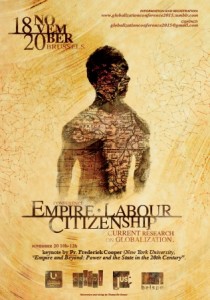Brussels, 18-20 November 2015
Since the second half of the 19th century, accelerations in the processes of globalization profoundly transformed human communities throughout the world.
This event aims at highlighting current research in human sciences around concepts of empire, labour and citizenship and their connections with the long-term history of mankind. During three days, researchers in history, anthropology and political sciences are invited to reflect together on how political superstructures, workforce management and the making of collective identities contributed to shape today’s globalized societies.
The conference will be closed by a lecture of Pr. Frederick Cooper (New York University), a leading scholar in the History of (post)colonial Africa, and a major contributor to academic debates on these topics.
Day 1. 18 November.
Venue: Vrije Universiteit Brussel, room to be confirmed.
12h-13h. Welcoming and registration.
13h-13h15. Welcome speech: Benoît Henriet (PhD candidate, Université Saint-Louis – Bruxelles), Romain Tiquet (PhD Candidate – Humboldt University – Berlin).
Panel 1. Empires and the making of global societies.
Discussant/chair : Pr. Kenneth Bertrams (Université Libre de Bruxelles).
13h15-14h45 KEYNOTE : Pr. Eric Vanhaute (Ghent University): ‘Frontiers of Empire. About Land, Labour and Commodities’.
14h45-15h. Coffee break.
15h-15h30. Pr. Paul Fontaine (Université Saint-Louis – Bruxelles) : ‘De Lyon à Rome – Africains et Syriens en Europe de l’Ouest sous l’Empire romain’.
15h30-16h. Fabienne Chamelot (PhD candidate – University of Portsmouth) – Romain Tiquet (PhD Candidate – Humboldt University – Berlin) : ‘Layers of Colonial Archives, Levels of Imperial Rule: Administrative Tensions between the Federal and the Local Power in AOF, 1936-1939’.
16h-16h30 Clothilde Houot (PhD Candidate – Université Paris 1-Sorbonne): ‘Building National Armies in the Middle Eastern Mandates. The Iraqi and Transjordanian Case’.
16h30-17h. Zaib Un Nisa Aziz (Teaching Fellow. Lahore University of Management Sciences): Passages from India. India anti colonial activism in exile, 1905-1920.
17h-17h30. Concluding remarks and final round of questions.
Day 2. 19 November.
Venue: Université Libre de Bruxelles, local AW.1.121.
8h30-9h30. Welcoming and registration.
Panel 2. The African experience of Labour.
Discussant/Chair: Pr. Benjamin Rubbers (Université de Liège – Université Libre de Bruxelles).
9h30-11h00. KEYNOTE : Dr. Sara Geenen (Antwerp University) : “Artisanal frontier mining of gold In Africa: Labour transformation in Tanzania and the Democratic Republic of Congo”.
11h-11h15. Coffee break
11h15-11h45. Pascaline Le Polain (PhD candidate, Université Saint-Louis – Bruxelles): Punishing the Resisters. Forced Agricultural Labour in Belgian Congo (1940-1945).
11h45-12h15. Adane Kassie Bezabih (PhD Candidate, Addis Ababa University): African Labour and Foreign Capital: The Case of Wonji-Shewa Sugar Estate in Ethiopia, 1951-1974.
12h-15-12h45: Kerstin Stubenvoll (PhD Candidate, Humboldt University – Berlin): ‘Applied sciences’: (Mis)readings and Scopes of Action in Constructing ‘the African Worker’ during decolonization (French Cameroon, 1940s-50s).
12h45-13h15: Benoît Henriet (PhD candidate, Université Saint-Louis – Bruxelles): ‘Deglobalizing the postcolony? The Changing Faces of Palm oil labour around Kikwit (Democratic Republic of the Congo), 1911-2015’.
12h45-13h45. Lunch break
Panel 3. Citizenship in a (post)colonial world.
Discussant / chair : Pr. Amandine Lauro (Université Libre de Bruxelles)
13h45-15h15. KEYNOTE : Pr. Emma Hunter (University of Edinburgh) : ‘Citizenship in Post-Colonial Africa: Dialogues between Past and Present’.
15h15-15h30. Coffee Break.
15h30-16h. Edenz Maurice (PhD candidate, Centre d’Histoire – Sciences Po Paris): ‘Amerindians, Creoles and Maroons. Schools as laboratories of (post-)colonial citizenship in French Guiana, 1930s to 1960s ‘.
16h-16h30. Marie Fierens (Postdoctoral Fellow – Université Libre de Bruxelles) – Ornella Rovetta (Postdoctoral Fellow – Université Libre de Bruxelles) : ‘Citizenship at a Crossroads: Transitions and Elites in Congo and Rwanda c.1950-1962’.
16h30-17h. Alexander Knoth (PhD candidate, University of Potsdam): ‘The Social Construction of the Citizen. Patterns of political membership and belonging in the EU (1945-2011)’.
17h-17h30. Sarah Demart (Researcher, Université de Liège): ‘Postcolonial citizenship in Belgium: the case of the Belgian-Congolese in the era of globalisation’.
17h30-18h. Concluding remarks and final round of questions.
Day 3. 20 November.
Venue: Université Saint-Louis – Bruxelles, local P-61
9h-9h45. Welcoming and registration.
9h45-10h: Welcome speech: Pr. Nathalie Tousignant (Université Saint-Louis – Bruxelles).
10h-12h. Keynote Pr. Frederick Cooper (New York University) : “Empire and Beyond: Power and the State in the 20th Century”.
Discussants : Pr. Nathalie Tousignant (Université Saint-Louis – Bruxelles), Pr. Emma Hunter (University of Edinburgh), Pr. Véronique Dimier (Université Libre de Bruxelles).
12h-13h. Lunch Break.
13h-14h30. Concluding roundtable : with Pr. Frederick Cooper, Pr. Véronique Dimier, Pr. Nathalie Tousignant, Pr. Emma Hunter.
More information here

